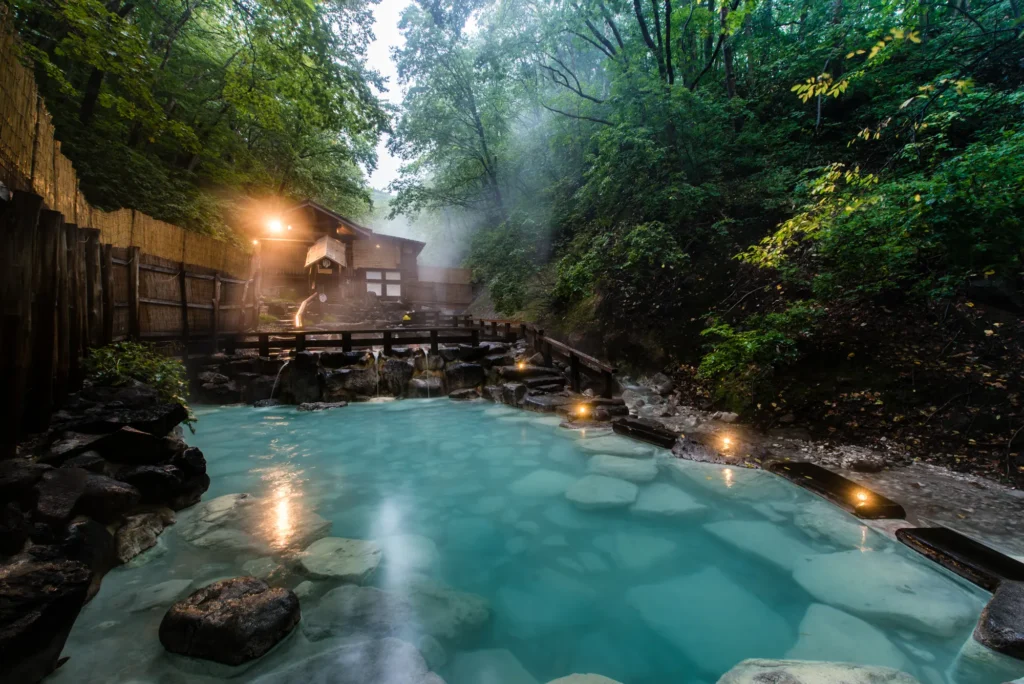As the wellness world continues to evolve, Japan’s traditional hot springs, known as Onsen, have emerged as one of the leading wellness trends of 2024. These natural springs, rich in minerals, are not only a key part of Japanese culture but are now gaining recognition for their remarkable physical and mental health benefits. In light of this, Japan Rail Pass has compiled a comprehensive guide on Onsen, highlighting their healing properties and the most popular destinations to experience these hot springs.

A Guide to Japan’s Traditional Hot Springs and Their Benefits
1. Medicinal Qualities of Unique Minerals
One of the most notable aspects of Onsen is the mineral-rich water that offers a range of health benefits. Onsen water can contain elements like calcium, sodium bicarbonate, sulphur, and iron. These minerals contribute to improving blood circulation, oxygen flow, and overall wellness.
Sulphur and calcium, in particular, are known to aid individuals with chronic skin conditions such as eczema or psoriasis, while sulphur also helps reduce hypertension and vascular conditions like arteriosclerosis. Additionally, Onsen rich in copper, magnesium, and iron can help alleviate anemia and support the menstrual cycle, earning them the nickname Kodakara no Yu or “childbirth Onsen.”
2. Physical Benefits of Heat and Water
Beyond the mineral content, the therapeutic warmth of Onsen water provides numerous physical advantages. The heat helps to expand blood vessels, alleviating inflammation and soothing sore muscles and joints. Moreover, the buoyancy in the water promotes relaxation, reducing stress and tension throughout the body.
Surprisingly, soaking in an Onsen can also have metabolic benefits. A 20-minute session in 42-degree Celsius water can burn over 200 calories, making it a gentle yet effective energy consumption activity.
3. Location and Environmental Effects
The location of an Onsen plays a significant role in the type of health benefits it offers. High-altitude Onsen (over 1,000 meters above sea level) can energize the body, while mid-altitude Onsen (up to 300 meters) are ideal for those with insomnia or high blood pressure. Meanwhile, coastal Onsen are perfect for individuals recovering from illness or battling chronic fatigue, thanks to the calming, mild climate of these regions.
Top Onsen Destinations in Japan
1. Kurokawa Onsen, Kumamoto
Nestled in Kyushu, Kurokawa Onsen is celebrated for its scenic beauty and traditional ambiance. Visitors can enjoy a variety of hot springs with a special wooden pass, offering a relaxing tour of the town’s baths, all surrounded by a serene riverside setting.
2. Beppu Onsen, Oita
Beppu, the hot spring capital of Japan, boasts the largest volume of natural hot spring water in the country. From sand baths to mud baths, visitors to Beppu can immerse themselves in unique spa-like experiences. Hyotan Onsen offers indoor and outdoor baths, complete with waterfall massages, sand baths, and steam baths, all naturally heated.
3. Kusatsu Onsen, Gunma
Kusatsu Onsen is famed for its acidic water, known for its healing properties. The water is so hot that it requires a special stirring technique, called yumomi, to cool it down. This practice, combined with Kusatsu’s stunning geothermal environment, makes it a must-visit.
4. Hakone, Kanagawa Prefecture
Hakone’s proximity to Tokyo and its breathtaking views of Mount Fuji make it a popular destination. The region’s hot springs, set in a tranquil landscape, offer visitors the chance to soak in healing waters while enjoying stunning natural beauty and cultural experiences.
Expert Tips and Etiquette for Onsen Visits
Haroun Khan, from Japan Rail Pass, explains the growing popularity of Onsen and offers tips for first-time visitors.
“With over 27,000 Onsen across Japan, these hot springs are an integral part of the country’s wellness culture. As more travelers seek relaxation and rejuvenation, Onsen have gained recognition for their therapeutic benefits. However, it’s important to familiarize yourself with Onsen etiquette, including rules about tattoos and specific customs at each location.”
For those looking to experience the ultimate wellness trend of 2024, Japan’s Onsen provide a unique opportunity to unwind and heal, both physically and mentally. For more information on planning your Onsen getaway, visit Japan Rail Pass.